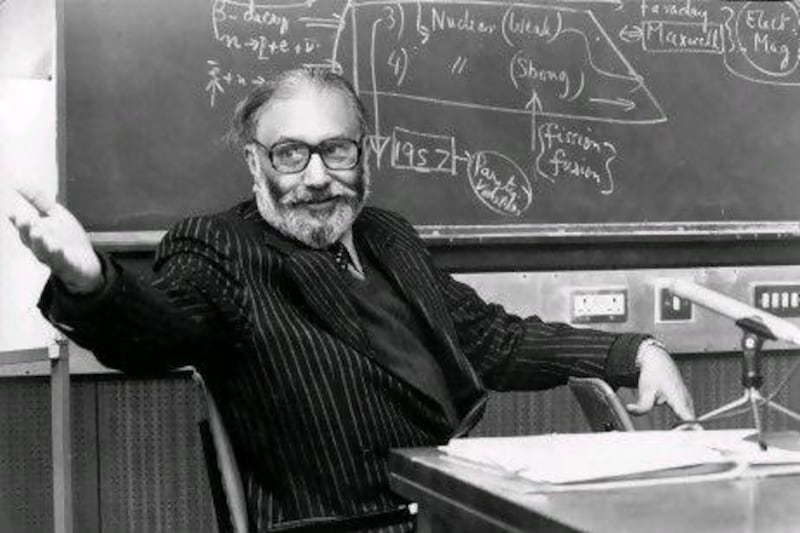ISLAMABAD // Pakistan's only Nobel Laureate, Abdus Salam, may have helped lay the groundwork that led to the discovery of the long-elusive Higgs boson particle but he has not received full recognition from his own country because of his religion.
Salam died in 1996 in England after leaving Pakistan and living abroad for 43 years. While his scientific work drew global acclaim, the response from Pakistan was muted - or worse.
Two Pakistani prime ministers snubbed him and even in death, his achievements have been all but ignored. Salam's name appears in few Pakistani textbooks and after he was buried in Rabwah in Pakistan, a local magistrate ordered that the word "Muslim" be erased from his gravestone that read "First Muslim Nobel Laureate".
Although Salam has not received acknowledgment from the country of his birth, there is no denying that the theories he helped develop with a US scientist in the 1960s paved the way for last week's scientific breakthrough.
The findings strongly suggested the discovery of the particle that has been subject of a nearly half-a-century hunt to explain how matter attains its mass.
Salam and Steven Weinberg, with whom he shared the Nobel Prize in 1979, independently predicted the existence of a subatomic particle now called the Higgs boson, named after a British physicist who theorised that it endowed other particles with mass.
Pervez Hoodbhoy, a Pakistani physicist who was a colleague to Salam, said Salam and Weinberg's work was "just about the most important discovery in physics in the last 40 years".
"Steven Weinberg and Abdus Salam realised that if such a particle existed, everything that we know today about particles could be understood within one overarching theory," Mr Hoodbhoy said. Arvind Gupta, the director general of the New Delhi-based institute of defence studies and analyses, agrees with Mr Hoodbhoy.
Salam "formulated the electroweak theory, which unifies the electromagnetic forces with weak forces at the subatomic level. He also suggested how to incorporate the Higgs mechanism into the Standard Model", Mr Gupta wrote in an article on the institute's website. However, in Pakistan, there has been near silence over Mr Salam's contribution to the landmark scientific achievement.
Mr Hoodbhoy said Salam was ostracised for being a member of the Ahmadi community, a minority sect in Pakistan that had been declared to be non-Muslims by the Pakistan government.
"Obviously it is religious prejudice," Mr Hoodbhoy said.
Ahmadis follow the teachings of Mirza Ghulam Ahmad, who in the town of Qadian in late 19th century British India founded the sect. His followers say Ahmad was a prophet, a suggestion that Muslims deem a breach of a basic Islamic doctrine that says the Prophet Mohammed was the last prophet.
Pakistan declared Ahmadis heretical in 1974 at the behest of major Islamic parties and in that year Salam resigned from his post as chief scientific adviser to the president in protest.
Salam's other achievements include helping to set up the country's space agency, and assisting to launch the country's nuclear programme.
In 1998, when Pakistan carried out its nuclear tests in response to India's tests, the government in Islamabad issued a commemorative stamp to honour Mr Salam's services along with other Pakistani scientists, but despite this analysts say that his efforts have largely been unrecognised in the country.
"His role in the nuclear programme was privately acknowledged by the government officials, scientists and bureaucrats," said to Shahid-ur-Rehman, a journalist and author of Long Road to Chaghi, which details the development of Pakistan's nuclear programme.
But Salam's work was "played down" because he was Ahmadi, he added. Mr Hoodbhoy criticised Pakistani leaders for their "boorishness" towards Salam, who had lived outside Pakistan since 1953.
He recalled that he was with Salam when he came all the way from Trieste, Italy, to meet the former prime minister Benazir Bhutto in 1989."Salam was very disappointed when her personal assistant rang up to say she did not have time," Mr Hoodbhoy said.
He said another former prime minister, Nawaz Sharif, omitted Salam's name from the list of distinguished alumni of the Government College, Lahore, one of the top colleges of Pakistan.
Salam, a child prodigy, was born in 1926 in the town of Jhang and won more than a dozen international prizes and honours, including from Pakistan's rivals India.
Ahmadis have long complained discrimination and persecution in Pakistan. This week, police in a tiny town of Kharian in Punjab reportedly demolished the minarets of Ahmadis' place of worship after local people complained that it resembled a mosque.
In 2010, 86 people were killed in bomb and grenade attacks on two places of worship for Ahmadis in Lahore in the deadliest strikes against the minority sect in the country.
[ foreign.desk@thenational.ae ]
* With additional reporting by Associated Press





